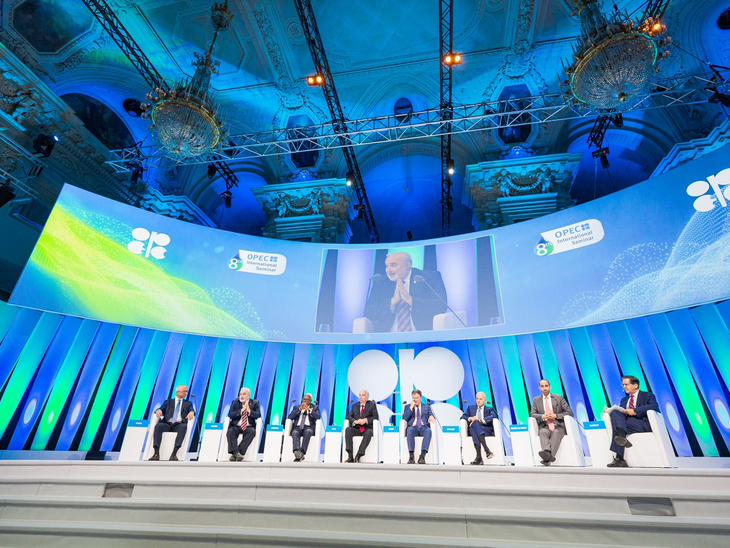
 Petrobras
Petrobras
For Jean Paul Prates, the challenge will be to replenish reserves and produce hydrocarbons at the same time that oil companies are becoming energy companies
Petrobras Agency
Alongside the CEOs of the world's largest oil companies, the CEO of Petrobras, Jean Paul Prates, defended the maintenance of activities with less impact on the environment and highlighted the urgency in mobilizing resources to encourage change in the energy transition. Prates was one of the speakers at the 8th International Seminar of the Organization of Petroleum Exporting Countries (OPEC), held at the Imperial Palace of Hofburg, in Vienna, Austria. This is the first time that a Petrobras’ CEO participates in the event.
“There is only one certainty today among national oil exporting states and state societies: we are in times of inevitable transition that will cost everyone much more in terms of decarbonization and re-exploitation/revitalization, than to start investing in other sources. Companies have the double challenge of replenishing reserves and producing hydrocarbons, while turning themselves into energy companies and investing in new sources. All of this with an indisputable concern not to leave anyone behind - neither workers nor consumers", stated the CEO of Petrobras.
The theme of the OPEC event was “Towards a Sustainable and Inclusive Energy Transition”. Jean Paul Prates was one of the guests on the “Investment in Energy: Challenges and Opportunities” panel. At his side were Shaikh Nawaf S. Al-Sabah, CEO of KPC (Kuwait); Claudio Descalzi, CEO of Eni (Italy); Russell Hardy, President and CEO of Vitol; John Hess, CEO of HESS Corporation (USA); Sebastião Martins, CEO of Sonangol (Angola); and Alfred Stern, CEO of OMV (Austria).
The CEO of Petrobras also highlighted the importance of considering the particulars of regions, markets and companies. “Different profiles will assign different missions. Some countries and companies will be required to persist in oil and gas exploitation while other companies have already migrated to other mixes. For those deeply associated with the current mixes, it is not just about changing the engines, but doing it from the inside out, in a process of metamorphosis”, he added.
The executive also highlighted that the process of exchanging one energy source for another is easy, however, the real challenge lies in the decarbonization of operations, in order to transform them into activities that are less harmful to the environment, while mobilizing resources to drive change.
“It takes more than a change in the product offered, it is necessary to change the demand and consumption habits. The challenge is to mobilize national governments to contribute to this initiative. On the other hand, for Governments that have energy companies, it is natural that they keep them as levers for change, which needs to be done both on the supply side and on the demand side”, he explained.
The 8th International Seminar of the Organization of Petroleum Exporting Countries took place on July 5th and 6th, in Vienna, Austria, and was attended by representatives of the industry and global authorities. The CEO concluded his speech by highlighting that the perspective of banning new fields (green fields) would not be realistic, being a more factual approach to think about downstream optimizations, as is already planned by Petrobras. “One way out would be to boost the revitalization of fields, allowing production at low cost, with sustainability. In this way, it will be possible to lead the industry to the irreversible situation of decarbonizing operations and definitive transition to new energy sources”, he concluded.

Contact us